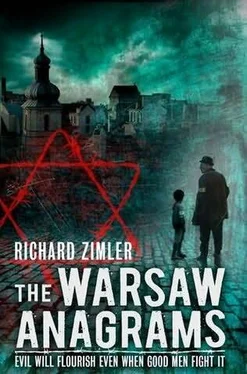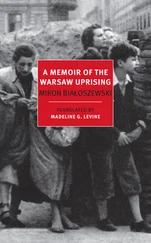Engal confirmed to me that Mikael Tengmann had indeed been killed shortly after Erik and Izzy’s escape from the ghetto. He told me that the physician’s body had been discarded one evening outside the front door of the Nozyk Synagogue. The rumour that Engal had heard was that bruises on Tengmann’s neck indicated that he had been strangled.
In response to my questions about Erik’s friends and neighbours, the professor added that the bakery in the courtyard where Ewa worked was shut down by the Nazis in July 1942. Shortly after that, Ziv purchased a pistol on the black market and joined the Jewish Combat Organization, telling everyone he would never permit the Germans to catch him alive. I have since discovered that, along with most of the members of that fighting force, he very likely died in the Ghetto Uprising, which began in January of 1943.
Ewa and Helena disappeared around the time the bakery was closed, and Professor Engal lost contact with them. In February 1952, however, the American Joint Distribution Committee was able to supply me with more information. Writing to me in Yiddish from New York, a researcher for that relief organization informed me that Ewa and Helena had been on the transport that left for Treblinka on 3 August 1942. They were gassed on arrival. My correspondent added that Rowy Klaus was transported to Treblinka several days later. From a camp survivor I later met while visiting Łódź, I learned that the young musician played violin in the camp orchestra that summer, but in the autumn he became ill with tuberculosis and was sent to the gas chamber.
Through my research, I have also learned that Zachariah Manberg – the little acrobat whom Erik hoped to save – managed to go into hiding with his mother and sister in Christian Warsaw in December 1942. Shortly after liberation, they moved to Canada. Zachariah is currently enrolled as a law student at the University of Toronto and we have established a correspondence.
I never learned whether Bina Minchenberg or Benjamin Schrei survived. They have vanished, like so many others.
Izzy was the person I most wanted to find out about, but I was unable to discover anything about his whereabouts – even if he had survived. Times were hard in Poland and it was impossible for me to travel to France to pursue my investigations. It took me years to accumulate enough savings and obtain the necessary papers from our Communist government. Finally, in the summer of 1953, I received authorization. Realizing that my wallet was as full as it was ever likely to get, I packed a bag and left.
Unfortunately, I didn’t find his sons at the address in Boulogne-Billancourt that Erik had given me. By then, I had learned that Erik had made an anagram of Izzy’s surname, which was not Nowak but Kowan. I located two Kowan families in Paris, but they weren’t Polish Jews and they had no relatives who were watchmakers from Warsaw.
To protect his old friend, Erik must have lied to me about Boulogne-Billancourt. Izzy’s sons were probably living in some other Paris suburb or elsewhere in France. I wished I had asked him to give me Louis’ full name – and made him swear to me that it wasn’t an anagram.
Shortly after my hunt through Paris for Izzy, I was able to locate Irene’s mother, Sylvie Lanik, in Bordeaux. When we met, however, she refused to tell me anything about her daughter except to say that she was alive and well, and living in Switzerland. Irene bore some responsibility for her stepfather’s death, of course, and though more than a decade had passed since his murder, Mrs Lanik may have still feared her daughter’s arrest.
In August 1953, after my travels around France, I caught a boat to Cyprus and went on to Izmir by freighter. By then, I had learned that Erik’s wife Hannah had had Sephardic cousins named Zarco. I questioned three members of the family about Erik’s daughter Liesel, and I talked to about a dozen other Izmir Jews, but no one admitted knowing her. On one occasion, while speaking with her second cousin Abraham Zarco, I had the feeling that his denial wasn’t entirely genuine, but all my attempts to win his confidence proved useless. Maybe Liesel didn’t wish to be found. Or perhaps the family wanted nothing to do with her because of her relationship with Petrina.
My most recent find is Jaśmin Makinska. Only three months ago, I learned that she was living in England, where she had emigrated shortly after the war. To my great joy, I received a reply to my letter to her about a month ago. She told me that she was living near Weymouth, in a two-room cottage by the sea.
Jaśmin confirmed that she drove Erik and Izzy to Liza’s farm in March 1941, and that her sister was murdered by the SS when Erik was captured on 7 July.
Izzy fled on foot late that same afternoon, she told me. He managed to telephone her from a nearby town and give her the terrible news about Liza.
Jaśmin received one letter from Izzy, mailed three months later from Istanbul. He had made it there by freighter from Odessa, just as he and Erik had planned, and he would soon be on his way to Marseille. He was in excellent spirits and had already received a friendly letter from his old friend Louis, though he was full of remorse over Liza’s death and without much hope for Erik.
‘Izzy told me that he would write again when he was settled in the south of France, but I never received another word from him. The war had spread by then, and I suspect that his letters simply never made it to Warsaw. After I moved to England, he had no way of finding me – and there was no way I could locate him either.’
I expect that Izzy, his sons and Louis may be living in or around Marseille. I shall do my best to find them.
Jaśmin promises not to give up searching for him, as well, though she also says that she’ll never set foot in Continental Europe again.
*
On the way home from Izmir, I stopped in Lublin and said a kaddish for Erik outside the Lipowa Street camp. And for all the other heroic friends of ours who were long gone, especially Johann, who had given up his life for me.
Seeing the muddy clearing where Erik had been hanged and hearing my trembling voice undid me, however. I felt as if I were pulling my existence out of an emptiness so great that everything I saw and felt was only an illusion.
I stayed just long enough to intone an ‘El Male Rachamim’ for Erik’s soul and then fled, though turning away from where he’d been murdered made me feel as though I was leaving behind the best part of myself.
I think of Erik every day of my life. I try to remember the dead in all their uniqueness, as he would have wanted.
The autobiography of the Jews is still being written. That is our victory. And I believe now that Erik’s deepest hope was for The Warsaw Anagrams to serve as his contribution to it. I am convinced, in fact, that that was why he returned as an ibbur.
Heniek Corben
Warsaw, 3 Kislev, 5715 (28 November 1954)
(all words are in Yiddish except where otherwise indicated)
Alter kacker – Literally, ‘old shitter’, but with the meaning of ‘old fart’.
Brenen zol er! – ‘May he burn in hell’; a common curse.
Challah – A yeast-leavened egg bread, usually braided, traditionally eaten on the Sabbath.
Der shoyte ben pikholtz – ‘The idiot son of a woodpecker’; a traditional epithet.



Dreidl – a four-sided top inscribed with the Hebrew letters and, which together form the acronym for (a great miracle happened there).
Читать дальше















